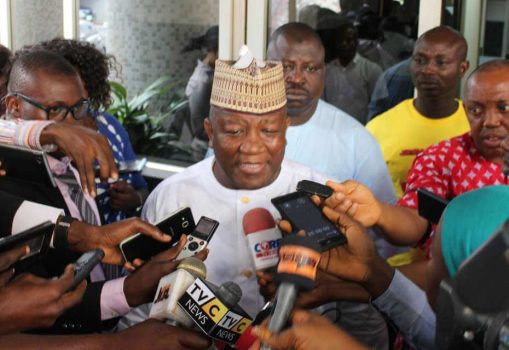
The Nigeria Governors Forum (NGF) on Monday warned returning and newly elected state governors to prepare for tough times ahead as the country may slide into recession in 2020.
Speaking at the induction programme organized for old and new governors at the NGF Secretariat, State House Conference Center in Abuja, the chairman of the Forum and governor of Zamfara State, Abdulaziz Yari warned his colleagues that it would not be a smooth ride when they begin a new administration in their respective states.
His words: “On our part, we made a lot of achievements in infrastructure development and provision of social services because we enjoyed a relatively high oil price of about $100 to $114 per barrel between 2001 and the middle of 2014.
“However, by the mid-2014 the price of crude oil which is sadly the main driving force of government’s expenditure, dropped to $75 per barrel. It therefore, became very difficult for many states to even pay salaries of their workers.
“This scenario is a wake-up call for all of you to be prepared to face this kind of challenge, especially since there is the possibility of another cycle of recession by mid-2020 and which may last up to the third quarter of 2021.
“Your good spirit of stewardship will make you contain the situation should there be one. Also as members of the National Economic Council (NEC), you must work hand-in- hand to boost the economy in tandem with the global best practices.
“Experience, they say is the best teacher. Ours has been a challenging experience of managing state economies that are totally dependent on accruals from the federation account rather than exploring viable alternatives to run the economy.
“For most of the states, internally generated revenues are nothing to write home about. You must therefore look inward by boosting your revenue generation and also utilize them effectively for execution of projects that will touch the lives of your people.
“You must not forget the high expectations of our people from us. Now that the democracy is maturing daily, the challenges of governance and service delivery are more demanding.
“Borrowing is never a reliable alternative to solving our economic problems. Key revenue agencies like the Nigerian National Petroleum Corporation (NNPC), Federal Inland Revenue Service (FIRS) and the Nigeria Customs Service must be made to work more effectively now that Mr. President has signed the much awaited national minimum wage law, pegging the minimum workers’ salary at ₦30,000 per month.”

President Tinubu Set To Depart For Two-Week Working Visit To Paris
Tinubu Reconstitutes NNPC Board, Appoints New Leadership
DSS Arrests Two Key Suspects In Edo Traveller Killings
NNPC Ltd Enters Final Stages Of Preparation For Public Listing